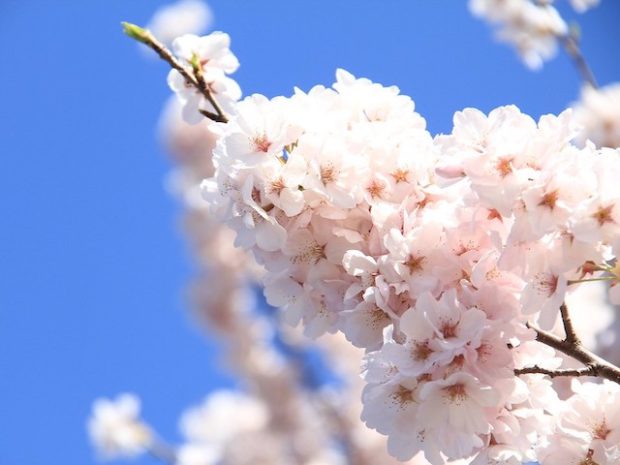You have no items in your cart. Want to get some nice things?
Go shopping
Anna hated cherry blossom’s dying sprawl. The untidiness of it. The neediness. How the fallen petals clung to her shoes, like wet, white moths, as though she was dry land to them. She laid down the axe on the grass and raised each itching foot in turn. She shook until a few petals unstuck and fluttered to the ground. The rest held fast.
“Whoosh!”
Prue swooped with airplane arms through the blossom’s sickly-sweet gunge and giggled. Her red hair swung behind her in an arc. So pretty, Anna thought – but as her daughter sprinted towards her and the blossom’s winged petals flapped and flailed and stuck to the little bare legs and the new blue dress and that glossy hair, she winced. Stop, she wanted to shout. Don’t come any closer.
Every spring, it was the same. Prue clapped and whirled around the shedding tree and the blossom flew to her. She loved the tree and it seemed to love her back in its cloying, dying-throes way. It was all his doing.
“Our daughter’s tree,” he had said the day he planted it. Anna gave birth that morning – “gave light”, they would have said back home – and when he arrived at the hospital, he cradled their little Prue for ten, perhaps fifteen minutes, before rushing away to plant a cherry tree at the foot of their garden. Prunus serrula, he said. Gorgeous. White blossom rather than pink. Bark the colour of glistening cherries.Your twin, he had whispered to Prue every day since, for the last eight years; until the night he left without a word’s explanation.
“Hello, lovely twin!” Prue sang as she approached the tree. Her laugh today sounded a notch higher than usual.
“Look at the state of you already.”
Prue flushed at Anna’s words. Her raised arms froze mid-air. Her elbows and wrists jutted out, like nubs on brittle, wintering branches.
“Your father didn’t think about that, did he?” Anna insisted. Sometimes she couldn’t stopper the voice inside her.
Prue stared up, silent.
“The mess this tree leaves behind,” Anna explained, training her daughter’s raised arms back down to her sides.
Prue still said nothing, but her eyes said she understood: Mum meant another mess left behind.
Anna wiped a petal caught in the crook of Prue’s neck and brushed at her winged dress. As she tidied, she looked across at the rhododendron by the fence. It had become a monster too. All those showy, purple flowers. All the waxy leaves that would curl into orange mulch come autumn. Every season in this garden brought its own particular untidiness and neediness. She glanced down at the axe lying beside her: a sharp, clean thing that might end all this mess.
“He always left me to clean up the mess.”
Prue stumbled forwards and let out a small whimper.
Anna reached out a steadying hand. “All right, petal?”
She needed to stop using that word. Petal. That was his word.
“Mum?”
“Sweetheart?”
Prue took another squishy step closer. “I could ask him.”
“What?”
“I could ask Dad to come and sort the garden – tidy the mess?”
Six months gone, with no explanation apart from metaphorical fogs and craters, and still Prue dreamed and plotted her father’s return. Every morning when Anna woke, there was her daughter hovering at the foot of the bed. “Is Dad home?” she’d ask. Anna would shake her head and Prue would sidle closer and pat the cold, empty side of the bed from head to foot – as though she’d rather doubt her own senses than hear her father’s silence and what it said.
“Can I ask him?” Prue’s mouth quivered.
“No.”
“But—”
“No, you won’t beg your father to see you. He should be asking you. Instead, it’s radio silence.”
A shudder passed through Prue’s body. Anna could feel it vibrate in the earth beneath them, like the drumming of a gull’s feet. Prue had never cried since he left. She only shook, as though she didn’t have the voice or salt for tears.
“He’s not silent. He messages me sometimes.”
Anna stared now at the rosebed he’d planted a couple of years ago. There was the first sign of his wanderlust, his edging towards mists and gorges. It was a blanket of red and yellow deadheads now. She’d already taken the secateurs to it this morning to avert the impending mess. Prue hadn’t noticed yet.
“Sometimes?” Anna repeated back. “Once in six months?”
Another shudder passed through Prue. For a moment, Anna wondered if she should stop – but it was time to break his story’s spell. Girls aren’t fables. Trees don’t make good sisters. Absence isn’t a place to sow seeds or to water or to try and make grow.
“We don’t need your father,” she said. “I can sort this garden.”
Prue waited.
“I’ll cement it over.”
“Cement?” Prue blinked, as though learning some terrible swear word.
“Like a pavement.”
This time, the tears rose to Prue’s eyes. A fold of petals drizzled from her dress. She stared down at Anna’s hands, saw the roses’ stings in them and flinched as she looked over at the blanket of deadheads.
“It’ll make our lives much easier, sweetheart.”
Prue’s eyes shone. “You’re going to chop it down? Everything Dad grew?”
Anna reached out and brushed her daughter’s cheek. “It’s much for me, on my own.”
“Even my tree?” Prue trembled.
Anna pointed to the mulch. “It makes too much mess.”
Prue tugged at a petal on her dress’s hem – or perhaps it was a moth, this time. “I’m sorry.”
“Why? It’s not your fault, sweetheart.”
Prue flushed. “She’s my tree spirit. And she makes a mess.”
“No, Prue. It’s just a tree. That was your father’s fanciful story.”
Prue fell to her knees and grabbed the axe with both hands. “I’ll help you tidy, Mum.”
Anna stared at her little girl’s wiry strength. “Put that down.”
“It’s fine.” Prue half-smiled. “I know how to use an axe. Daddy taught me. Undercut first, he said.”
“Undercut?” Anna asked.
“Here. I’ll show you.”
Prue planted herself, feet apart, in front of her glistening tree and swung the blade.
“I’ll fell me.”

About Carol Farrelly
Carol Farrelly is a fiction writer. She has been a Robert Louis Stevenson Fellow and a Scottish Book Trust New Writer. Her short stories have been published in The Irish Times, New Writing Scotland and Stand; broadcast on Radio 4; and shortlisted for the Bridport Prize and RA & Pin Drop Short Story Award. She's currently working on a first novel and a short story collection. www.carolfarrelly.com
- Web |
- More Posts(1)




